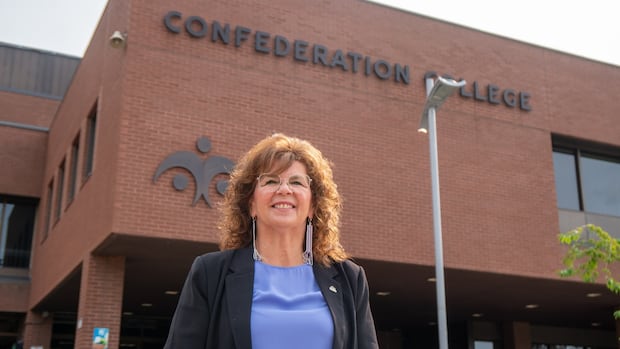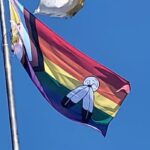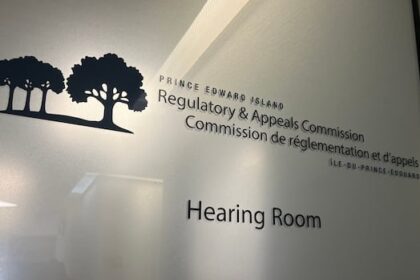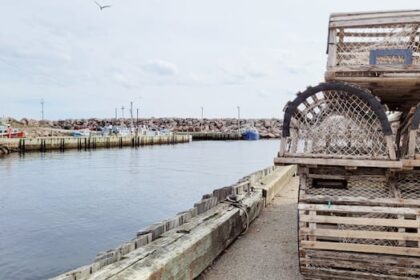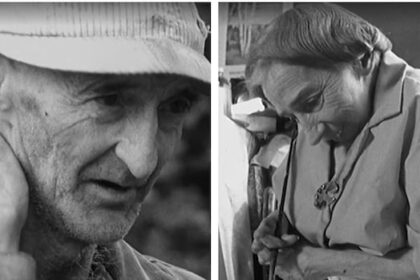Thunder BayFort William First Nation’s flag has been permanently raised at Confederation College’s campus in Thunder Bay, Ont. Here’s what the flag raising means as the college rolls out its new Indigenous Reconciliation Action Plan.Flag now permanently on display at Thunder Bay campusSarah Law · CBC News · Posted: Sep 09, 2025 4:05 PM EDT | Last Updated: 2 hours agoChief Michele Solomon of Fort William First Nation says she hopes her First Nation’s flag, which has been raised at Confederation College in Thunder Bay, Ont., helps educate staff and students about the land’s history. (Sarah Law/CBC)When Michele Solomon attended Confederation College in Thunder Bay, Ont., 25 years ago, she says reconciliation “wasn’t a conversation that was happening.”The chief of Fort William First Nation, which neighbours the northwestern Ontario city, says a lot has changed since then, particularly following the release of the Truth and Reconciliation Commission’s Final Report in 2015.A decade later, the broader public has become much more aware of First Nations culture and the ongoing legacy of colonialism, said Solomon.Michelle Salo, president of Confederation College, says the school’s Indigenous Reconciliation Action Plan lays out the school’s commitments to decolonizing education. (Sarah Law/CBC)On Monday, Solomon joined the college’s president, Michelle Salo, in permanently raising Fort William First Nation’s flag at the Thunder Bay campus, an acknowledgement that the school is situated on Fort William’s traditional territory.LISTEN | Sarah Law: Fort William First Nation Flag Raising Ceremony Superior MorningSarah Law: Fort William First Nation Flag Raising CeremonyFort William First Nation’s flag is flying high at Confederation College’s Thunder Bay campus. We hear what the flag symbolizes as the school embarks on its new Indigenous Reconciliation Action Plan. Especially for those who aren’t from the area, “it really helps them to know whose land this is, and this is an important part of educating the public,” Solomon said.However, “it can’t be the only method of conveying information about treaty, about Indigenous people.”Fort William First Nation’s flag depicts an eagle soaring above Anemki Wajiw (Mount McKay) in northwestern Ontario. (Sarah Law/CBC)The flag raising is part of Confederation College’s new Indigenous Reconciliation Action Plan, which launched in June.”It’s not just about words. We need to really represent the land that we’re actually working on and where we’re delivering programming here,” Salo said.”It’s an infinite plan that allows us to show our commitment through a number of actions,” she continued. “We’ll make sure that we’re continuing to address reconciliation throughout the entire college.”‘Open the dialogue’Blake Kawtiash is a third-year student in the college’s interactive media development program. He attended the flag raising ceremony to show solidarity for Indigenous people, he said.”It’s our homeland. We grew up with these trees, we grew up with the animals. We have a relationship to the trees and essentially, we are the waters that run through Thunder Bay,” Kawtiash said.”Fort William is a part of that heritage, it’s a part of that legacy, and so it’s very important.”As he and a classmate enjoyed bannock served after the ceremony, Kawtiash said he hopes other students who see the flag recognize what it means for past, present and future generations.”It’s definitely important to remember not only those who are from this land, but also those who passed on, like our ancestors,” he said.”Also to remember the future, the future people [that] are going to be using this land.”Sheila DeCorte, an elder from Fort William First Nation, provides opening remarks, a prayer and a song during the flag raising ceremony at Confederation College’s Thunder Bay campus. (Sarah Law/CBC)For Solomon, the flag acts as a visual reminder of the land’s history.”I hope that there is information that is shared [with] the students in their first week of college to talk about the land that they’re on and having an introduction to the territory that they’re on, so that there is more being done to open the dialogue,” she said.Several events are planned at the Thunder Bay campus leading up to the National Day for Truth and Reconciliation on Sept. 30. These include: A powwow recognizing missing and murdered Indigenous women and girls (MMIWG) followed by a fall feast on Sept. 17, starting at 10 a.m. outside the wellness centre. An Indigenous film screening on Sept. 19 from 10 a.m. until 2 p.m. in the Shuniah Student Lounge. An Indigenous art display on Sept. 26 from 10 a.m. until 2 p.m. in the Shuniah Student Lounge. A tree planting in the Indigenous garden followed by a gathering in the outdoor classroom on Sept. 30, starting at 11:30 a.m. ABOUT THE AUTHORSarah Law is a CBC News reporter based in Thunder Bay, Ont., and has also worked for newspapers and online publications elsewhere in the province. Have a story tip? You can reach her at sarah.law@cbc.ca
Friday, 6 Feb 2026
Canada – The Illusion
Search
Have an existing account?
Sign In
© 2022 Foxiz News Network. Ruby Design Company. All Rights Reserved.
You May also Like
- More News:
- history
- Standing Bear Network
- John Gonzalez
- ᐊᔭᐦᑊ ayahp — It happened
- Creation
- Beneath the Water
- Olympic gold medal
- Jim Thorpe
- type O blood
- the bringer of life
- Raven
- Wás’agi
- NoiseCat
- 'Sugarcane'
- The rivers still sing
- ᑲᓂᐸᐏᐟ ᒪᐢᑿ
- ᐅᑳᐤ okâw — We remember
- ᐊᓂᓈᐯᐃᐧᐣ aninâpêwin — Truth
- This is what it means to be human.
- Nokoma


